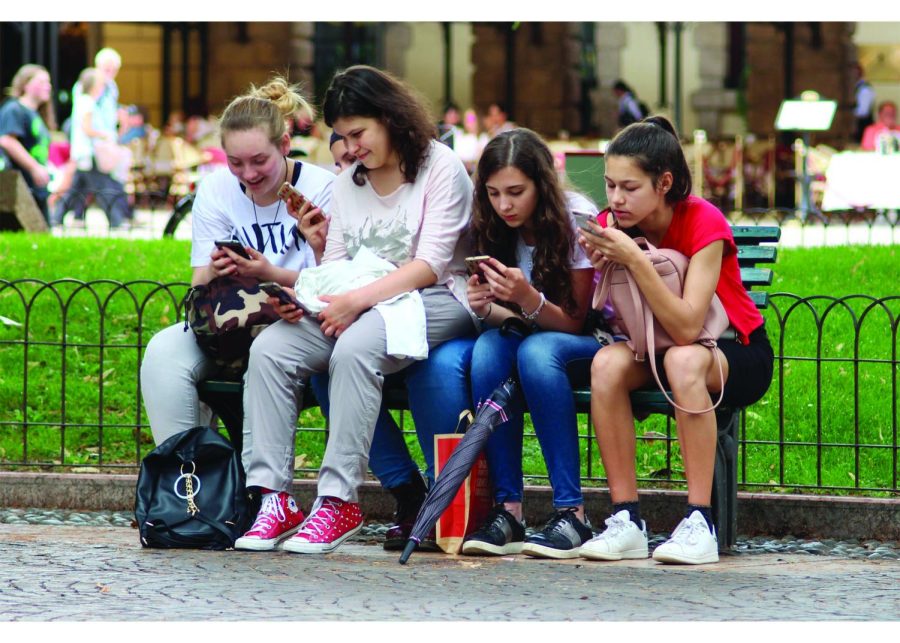Gen Z Says ‘Don’t Be a Phoney’
Teenagers begin to take time away from social media and phones of their own volition
May 8, 2023
From smashing looms in a fit of rage in the 18th century, the contemporary iteration of the Luddite lifestyle lives in New York City as a teen group that sits and reads books, carves wood, makes clothes and uses typewriters.
The Luddite Club, founded by 17-year-old Logan Lane, was inspired by an increase in the use of technology and the damage associated with addiction. The name comes from Ned Ludd, 18th century weaver who destroyed looms out of fear that mechanized weaving would take the jobs of handweavers. Once a week, these teens meet to put down their phones for a while to do anything else. Most of these teens still use a smartphone in daily life, but that disconnect for even a little while is better than not at all. Just like addiction to a substance, a gradual letting go may be more effective for some than a complete cut off.
While it is virtually (pun intended) impossible to go without a cell phone at this time, many have opted for flip phones. According to the International Data Corporation, “foldable phone shipments will reach 27.6 million units in 2025 with a compound annual growth rate of 69.9% from 2020 to 2025.” The flip phone market is also increasing profits. With the ability to communicate to worried parents, it provides a decent middle ground.
The effectiveness of this cutoff comes primarily from teenagers realizing the damage of social media on their own. This personal conviction provides most of the drive to this commitment. The consequential boredom is also normal as it is with most people, but whether to cave in or to make new hobbies is a personal decision.
When I first read about Luddite teens, I was very, deeply, jealous. While I consider deleting social media every day, I push off that day. I use my alarm to wake me up, my camera to take pictures so I don’t forget things, a notes app for reminders, email for school, GroupMe in all of my after school activities and Instagram to publicize those same activities. Unfortunately, the worst part of this is GroupMe. As someone connected to groups within school, GroupMe is my primary form of communication, second only to email.
My annoyance with these Luddites is that my immediate assumption was that they do nothing if they can go without constant pressure on all sides to respond to communication. When someone applies for a leadership position, or any position at all, people look for good communication. “Good,” means being available at all hours, and an immediate response. I expect this from others as well.
It’s easy to look at how toxic this all is, but the world will not stop for you. The world will go on without you, which is a rather backhanded compliment. If you disconnect, you might not be missed for that long – those who really care will reach out, and those who don’t, won’t. As morbid as it all sounds, this is mostly my own reaction against these teens with the right idea but ridiculous privilege. There’s a little superiority and pretentiousness inherent to this movement, which is probably the most grating.
Another immediate concern I had for this movement was how parents would communicate with their children. After school activities, last minute changes to plans, late night events and emergency situations call for a method of communication in this time and location. While we’ve all heard the stories of European families who typically allow their children considerably more freedom, everyone now expects everyone else to be available all the time. When I text someone, I tend to wait impatiently for them to respond, because I know teenagers are all addicted to their phones and it shouldn’t take too long.
As fun as this all sounds, I haven’t been able to as long as clubs are happening. This might be something to try this summer once I’m away from expectations I’ve built here, which have even required me to be present over the summer. While this is all my own doing, this is definitely something I’d like to try to get away from, at least for a few months.
So, here is a list of things to try instead of TikTok:
- Read books. If you’ve lapsed in reading lately, try rereading something, even children’s books. I love “The Secret Garden” by Frances Hodgson Burnett. If you’re looking to challenge yourself, read something written by an author who is not your race or from your country or your timeline.
- Crafts. Everything people were making during lockdown: crochet, knitting, sewing, painting, cardmaking, jewelry making, all of it. Rock painting, even.
- Make music, even CDs. If you’re musically talented, go for it. If you’re not, there’s no time like the present to make some noise. Most of us in this generation have never burned a CD, much less touched a mixtape.
- Write by hand. Write stories, write poems, write journals, write letters, write cards, write notes. Maybe don’t hand write your resume, but everything else should be fine.
- Puzzles. There’s picture ones, block ones, cube ones, number ones, letter ones and a lot more. Logic puzzles claim superiority, though.
- Anything outside. Go on a walk, go on a run, go on a swim when the weather gets warmer. Camping, if you’re into that.
Of course, this all sounds very fun. My initial plan for this story was to not use my phone for a day and report my scientific findings. Unfortunately, my addiction to GroupMe is not so easily swayed, so that did not happen. However, I started looking for a roommate by messaging people through Instagram, and my inability to respond to messages has also led me to avoid using Instagram. My reduced hours on the app has definitely helped me not waste time, but I have unfortunately been able to waste time in many other ways.
Whatever your journey with your cell phone is, I am of the belief that moderation is key. While it’s unrealistic to fully disconnect, small doses can make a difference.



